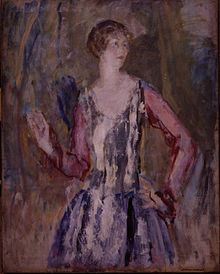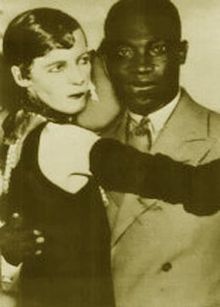Nancy Cunard

Lady Nancy Clare Cunard (born March 10, 1896 in Nevill Holt , Leicestershire , England, † March 17, 1965 in Paris ) was a British publicist , poet and publisher . The rich heiress was considered a radical and feminist eccentric . She was vigorously committed against racism and sympathized with the communists . She stood up for the defendants in the scandalous Scottsboro trial , agitated against Mussolini , Franco and National Socialist Germany .
Life
Nancy Cunard was the only child of Sir Bache Cunard, 3rd. Baronet (1851–1925), a grandson of the founder of the Cunard Line shipping company , Samuel Cunard , who was interested in polo and fox hunts , and his wealthy California wife Maud Alice Burke (1872–1948), later Lady Emerald Cunard. Unlike her parents, who enjoyed their lifestyle and high society, Nancy had an aversion to it from a young age. Nancy received extensive training, spoke several foreign languages, and showed an interest in art and mythology - she was considered precocious and extremely intelligent. George Moore , a friend of the family, aroused in her a special interest in poetry and literature . From the age of 14, Nancy attended several private schools in England , Germany and France . She made friends with intellectuals and sought contact with those who think differently. The circle of friends - including Iris Tree , Lady Diana Cooper , Osbert Sitwell and Raymond Asquith - who was to become famous as Corrupt Coterie , spent the evenings discussing politics and poetry in the Parisian cafés. On her return to England, Nancy Cunard, to the surprise of her family and friends, married the officer and cricketer Sir Sydney Fairbairn (1894-1956) in London in 1916 . The marriage ended in formal separation after 20 months; The divorce followed in 1925.
Her move to Paris in the 1920s was a chance for her to escape her parents' home and the oppressive narrowness of married life and live independently. She frequented the artistic circles of Surrealism , Realism and Dadaism , drank a lot of alcohol and - so it is assumed - also experimented with marijuana . She also published her first volumes of poetry, Outlaws , followed by Sublunary and Parallax . Aldous Huxley was one of her lovers and she became his muse . The latter also applied to Ernest Hemingway , James Joyce , Constantin Brâncuși , Wyndham Lewis , Tristan Tzara , Louis Aragon , William Carlos Williams and Man Ray . Nancy also wrote herself, so that during her time in Paris many poems were written that were eventually published in bulk. In 1927, Cunard bought an old farmhouse La maison du puits carré in La Chapelle-Réanville , Upper Normandy - where she invited well-known artists and writers.
After eight years of carefree life, Nancy decided in 1928 to start her own publishing house, based near the famous Parisian bookstore Shakespeare and Company . "The Hours Press" was supposed to promote experimental poetry . Cunard paid her writers decently and was able to take risks other publishers couldn't. Her books were handcrafted and beautifully designed.
Nancy Cunards Hours Press took over Bill Bird's Three Mountain Press (which had books by Ezra Pound, William Carlos Williams, Robert McAlmon, and Ernest Hemingways In Our Time ) and published works by George Moore ( Peronnik the Fool , 1928; The Talking Pine , 1931 ), Ezra Pound ( A Draft of XXX Cantos , 1930), Laura Riding and Robert Graves , Norman Douglas ( One Day , 1929), Richard Aldington ( Hark the Herald , 1928; The Eaten Heart , 1929; Last Straws , 1930), Alvaro Guevara, Arthur Symons ( Mes souvenirs , 1929), the first book by Samuel Beckett ( Whoroscope , 1930), Havelock Ellis , Louis Aragon, Roy Campbell , Walter Lowenfels ( Apollinaire: an Elegy , 1930), the imaginistic poems of John Rodkers, Bob Brown ( Words , 1931), Harold Acton, Brian Howard ( God Save the King , 1930), the catalog Paintings, Drawings and Gouaches by Eugene McCown (1930), in the same year Henry Crowder's Henry Music appeared with Crowder's scores and poems of Cunard, Aldington , Lowenfels, Beckett, and Harold Acton.
In the year in which she founded her publishing house, she met the Afro-American jazz pianist Henry Crowder (1890–1955). The two fell in love and eventually lived together. The very fact that her daughter was dating an African American made Nancy's mother upset and indignant. In addition, the salon rebel began to work officially against racism . She published anthologies with black writers, which made headlines in the press and, among other things, drew the attention of the Ku Klux Klan to the publisher. She received threats and hate letters, and her own mother reported her to the police. But the young woman was not intimidated by this. In addition to her work against racial segregation , she also fought against fascism . During the Spanish Civil War she helped on site in the refugee camps and in collaboration with the poet Pablo Neruda she wrote anti-fascist articles for the Manchester Guardian . Due to illness, she returned to Paris and joined the French Resistance to remain politically active and fight for her principles.
After the war, the Rosette of the Legion d'honneur (1947) traveled extensively while writing as a freelance correspondent on the effects of colonialism . In the early 1960s, her health deteriorated noticeably, both physically and mentally, and she was admitted to a psychiatric hospital in Paris . In March 1965, police found Nancy Cunard unconscious on the side of the road. She died a few days later at the age of 69 in the Hôpital Cochin of the consequences of her excessive and sometimes very poor lifestyle. Her ashes were buried in the Cimetière du Père Lachaise in Paris.
Names in different phases of life
- 1896–1916 Lady Nancy Clare Cunard
- 1916–1925 Lady Nancy Clare Fairbairn
Works
|
|
Secondary literature
- Lois Gordon: Nancy Cunard: Heiress, Muse, Political Idealist , Columbia University Press (2007), ISBN 0-2311-3938-1
- Unda Hörner : Nancy Cunard. Enfant terrible of the Parisian Bohème , Edition Ebersbach (2003), ISBN 3-934703-24-0
- John Lucas: Nancy Cunard: Poems of Nancy Cunard from the Bodleian Library , ISBN 1-84233-107-8
- Alan Warren Friedman: Beckett in Black and Red: The Translations of Nancy Cunard's "Negro" , The University Press of Kentucky (2000), ISBN 0-8131-2129-9
- Susanne Nadolny: Lived Longing: Border Crossers of Modernity , Edition Ebersbach (2005), ISBN 3-938740-01-9
- Anne Chisholm: Nancy Cunard , New York: Penguin Books (1981), ISBN 0-14-00-5572-X
- Daphne Fielding: Emerald and Nancy: Lady Cunard and Her Daughter , (1968), ISBN 0-413-25950-1
- Sasha Colby: Staging Modernist Lives. HD , Mina Loy , Nancy Cunard. Three Plays and Criticism. McGill Queen's University Press, Montréal 2017
Web links
- Literature by and about Nancy Cunard in the catalog of the German National Library
- Nancy Cunard. In: FemBio. Women's biography research (with references and citations).
- Nancy Cunard Collection Harry Ransom Center (English)
- Henry Crowder and Nancy Cunard (English)
- Nancy Cunard: POEMS OF NANCY CUNARD from the Bodleian Library (English)
- Nancy Cunard (English)
Remarks
- ^ The New York Times - The Rebel Heiress
- ^ Times Online - Nancy Cunard, rebel lover
- ↑ Set Apart: Nancy Cunard by Renata Morresi
- ^ Nancy Cunard: Rebellious Heiress, Inspired Life
| personal data | |
|---|---|
| SURNAME | Cunard, Nancy |
| ALTERNATIVE NAMES | Cunard, Nancy Clare; Fairbairn, Nancy |
| BRIEF DESCRIPTION | British journalist, publisher and publicist |
| DATE OF BIRTH | March 10, 1896 |
| PLACE OF BIRTH | London |
| DATE OF DEATH | March 17, 1965 |
| Place of death | Paris |

